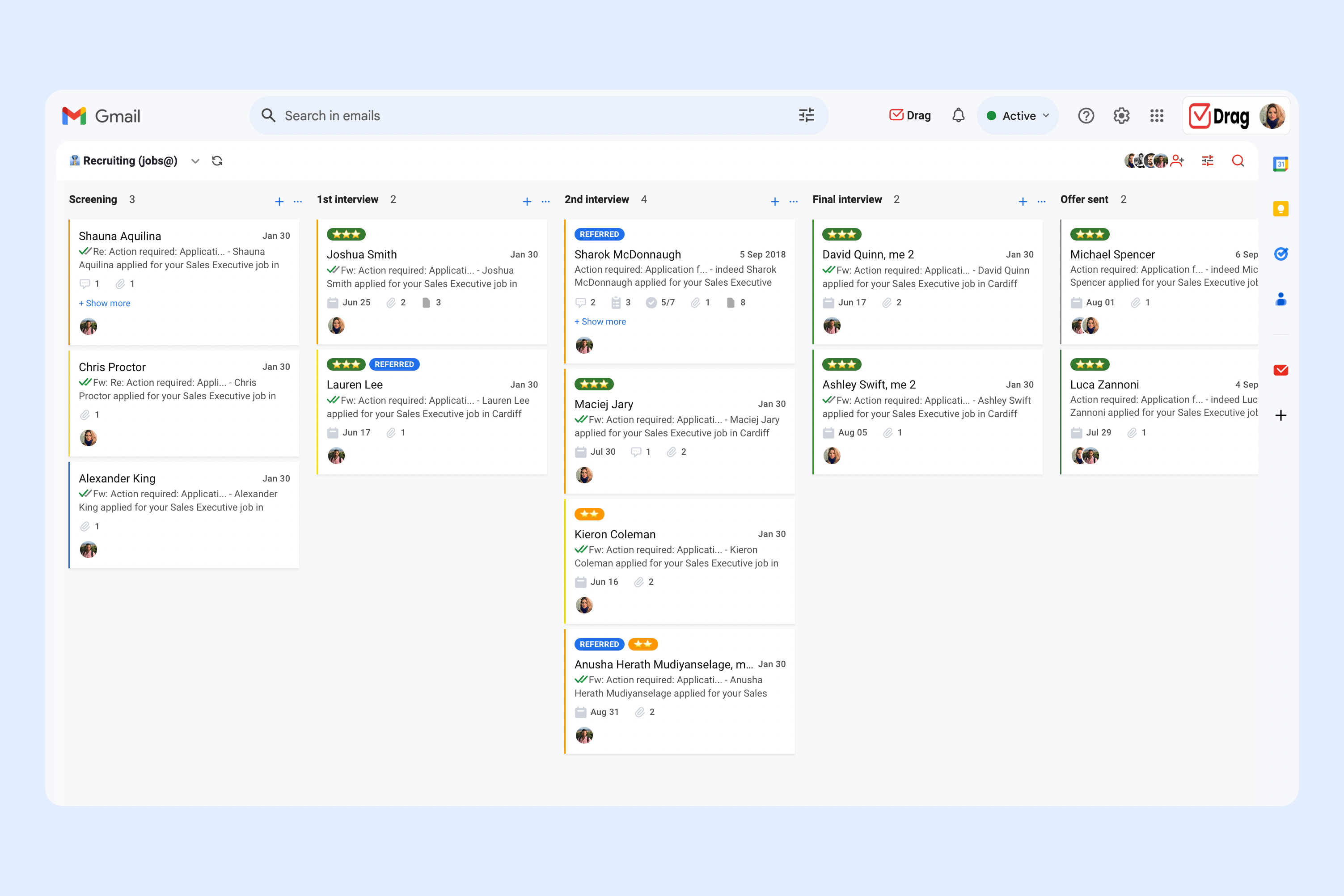
Real estate is an interesting industry to work with. While it poses certain industry-specific challenges, such as market trends and financing risks, it has huge growth potential. Which is why real estate customer service is crucial.
Real estate agents, owners, agency leads and other parties are dealing with high-pressuring, high-risk deals with clients. On the other hand, clients are taking on purchasing risks of their own. The situation calls for clear, fast and effective communication systems. After all, losing a deal or a potential client can be detrimental to the overall growth of the agent.
The first step to a compelling sales relationship is, of course, having good products easily accessible. So real estate agents should use real estate software to display their options to potential new buyers. If they’re catering to sellers, they should highlight any relevant expertise.
Then, the website needs to offer a clear user experience. AKA: enough information available in case the potential buyer or seller wants to reach out to an agent. But what happens next? How can professionals in this industry truly offer what their clients need?
Real estate customer service best practices
There’s no clear-cut way to offer great real estate customer service. This is a highly personal field with different customer profiles. An agent needs to be attuned to any trends and niches. However, some basic best practices will enhance the overall experience and attract new clients.
Personal interaction
Since each client and agent is different, it’s a bit more challenging to offer the ideal support for each one. For example, some clients are looking for high-end homes, while there are buyers who prefer savings in place of convenience. On the seller’s side, there’s building a sustainable relationship in which the customer trusts your expertise.
And when dealing with real estate customer service, all of them have to be accounted for. You can – and should – take advantage of AI in customer service and email automation to organize your inbox. But it’s clear that real estate leans a lot into customized support too.
So, as usual, customer service emails have to be fast and clear. But they also need to convey your full attention to each customer’s needs.
Fast response time
That shouldn’t come at the expense of time efficiency, though. Since real estate customers are buying or selling an asset that might have a huge impact on their finances, they do plenty of research. So they might be reaching out to multiple potential agents when looking for a match.
That means professional email response times matter a lot. Not only when you first reply, but also the time you take to answer any questions they have. Given the extensive nature of real estate research, people ask many questions. And a good agent should be able to offer clear, fast replies on the matter.
Say, for example, a buyer has questions about a property tax. Or maybe they want to start negotiating with the seller. The agent should email or call back with all relevant information quickly. All while translating any industry language that the customer might not be familiar with.
Scheduling and convenience
Another good practice that lends itself to great real estate customer service is scheduling and availability. Often, clients are faced with hurdles during the buying or selling of property. Timing and scheduling are some of these issues.
For example, the potential buyer sees a property ad on the website. Upon calling to schedule a visit, they find out there are no available days that fit their schedule. Or that so many people have visited that there are already multiple offers.
Or perhaps the seller has a deadline, but the agent doesn’t offer enough property tours for interested customers.
Either way, the idea here is that the market currently lacks good scheduling in real estate customer service. This process should be easy on both sides of the deal. Both sellers and buyers should have enough options to make an informed choice.
Specified research
But what truly differentiates an okay real estate customer service from a stellar one is offering actual real estate research for all types of customers. Often, customers are met with options that don’t fit their budget, lifestyle or priorities. So no deals are closed and they might even go to another agent.
A good real estate agent should pay attention to what their customers’ wishes are. What are the negotiables and nonnegotiables? Then match this information with current market scenarios. While not all expectations will be met, it’s crucial to try and get your customer to as many options as possible. That way, they are far more likely to close the deal and end the process satisfied with your services.
The challenges of real estate customer service
Real estate customer service faces a unique set of challenges, influenced by the high-value transactions and the complexity of the buying or selling process.
Seamless bureaucracy
The cost of real estate transactions means that customer expectations are high, placing high pressure on agents to deliver exceptional service and efficient communication. Customers expect a seamless, highly personalized buying or selling experience, with clear, timely information and support at every step of this process. This requires real estate professionals to not only be experts in the market but also adept at managing relationships, financial and emotional expectations, and resolving any issues with bureaucracy that might be placed on them.
Adversity and hurdles
Additionally, the real estate sector is notably affected by high fall-through rates, where deals that initially seem certain to close will change fast. In fact, about 25% of home sales in the UK fell through in 2023’s Q2. This volatility introduces significant challenges in customer service, as managing client expectations, disappointment, and frustration becomes a critical part of the process.
Time management
Besides paying attention to all of their clients’ needs, real estate agents need to manage their own work schedules. These can be hectic, with property showings, research, bureaucracy, paperwork and deadlines. All of this, of course,e while maintaining the sought-after availability to each client’s inquiries, unexpected issues, and last-minute changes that are common in real estate transactions.
At the same time, they often have to communicate with other people in the real estate business, from inspectors and contractors to finance institutions, legal representatives and more.
Turn Gmail into your Team’s Workspace.
- 2.5x faster email responses.
- 20 hours less spent per month, per team member.
- 40% more deadlines achieved and happier teams.
The tools you need for stellar real estate customer service
To offer the ideal sales environment, real estate professionals have to develop certain abilities, such as communication, time management and being empathetic to customers’ expectations. However, there’s also a case for using efficient tools that will help these professionals reach customers where they are.
Scheduling tools
Maintaining a schedule is key when dealing with bureaucratic projects. From dealing with vendors, legal concerns and deadlines, the real estate agent needs to be two steps ahead at all times. However, they also need to be available to each of these parties, offering services that often have to fit within their clients’ schedules. For example, setting up property tours or organizing a staging service for a photography session to add a home to your catalog.
Some tools help with that, from calendars to spreadsheets, so that real estate agents can organize their time better. One option is using Google Calendar, the native Google Workspace tool. When you have a business Gmail account, you can set up meeting links and invite your customers.
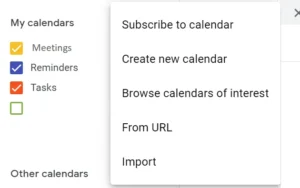
You can also set up different calendars for each kind of task, perhaps a version for your property sellers and buyers and another for vendors. You can also organize your calendars with tags and a color-based system so that you can view your entire schedule at a glance.
Communication tools
Of course, you need to communicate with all the different people across the real estate deals. First of all, if working with an agency, it’s important to collaborate with coworkers on different projects and inquiries from clients. So it’s smart to set up a reliable system where professionals can interact with each other during their deals.
Then, when working with customers directly, you’d probably benefit from scheduling meetings and phone calls to understand their priorities better.
There are many excellent tools in the office communication space, including some that could benefit real estate customer service agents. For instance, Slack might be a good choice for interacting with your coworkers in real time, with different chat channels for each subject. It’s a favorite among multiple industries for its efficiency.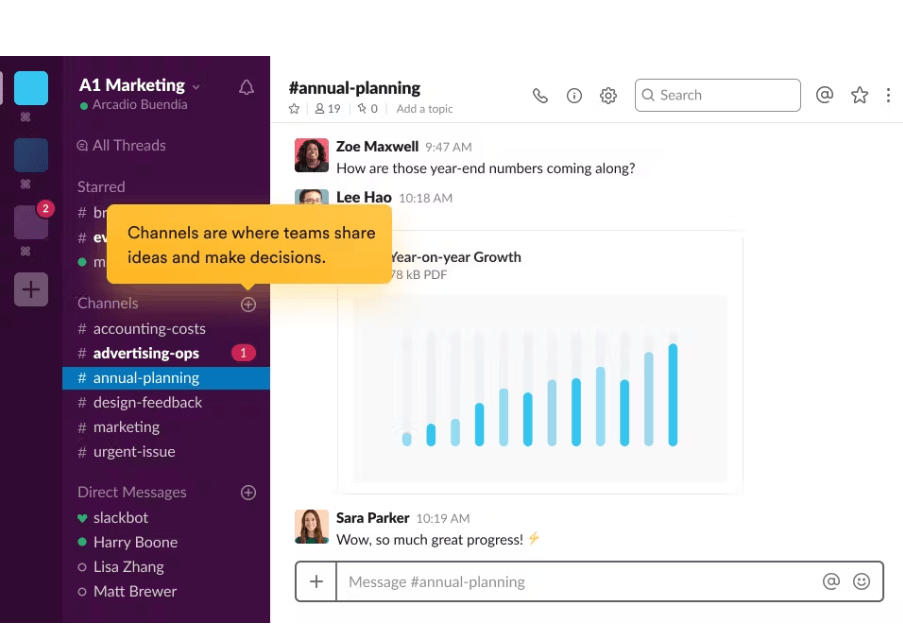
For virtual meetings and phone calls, real estate agents who use Gmail can use Google Workspace’s Meet software for free. That includes audio and video calls you can use to interact with clients. Bonus: with this resource, you don’t have to disclose your own phone number and personal email. Instead, you use a professional email account that unifies all interactions.
Invoicing and payment tools
Due to the high-ticket nature of real estate, giving great customer service is essential even after you close a deal. The payments and accounts payable software needs to work alongside you to reach out to customers and vendors accordingly, so that they’re fully informed, but you get paid in time. This is even more important when payments need to be made on a tight schedule to secure legal deals.
One of the resources real estate customer service agents can use is Xero, an email-based solution that can simplify your financial workflow. When you send receipts and invoices to a defined address, the program centralizes them into a functional tool to organize your influx.
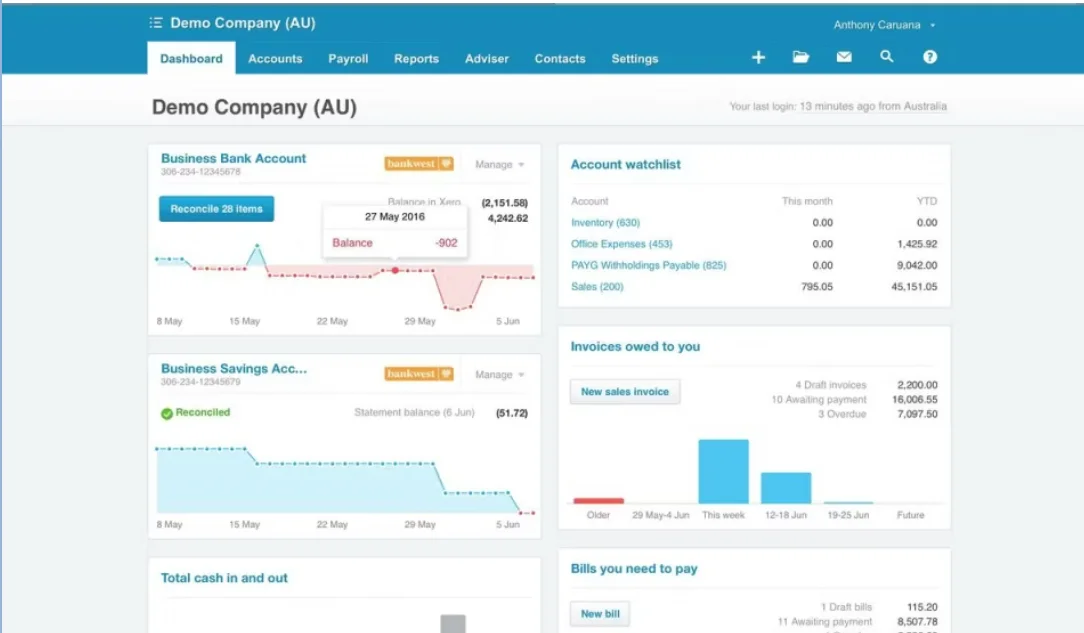
Project management tools
Keeping a streamlined workflow is essential in any line of work, but real estate customer service requires even better organization systems. This is why a project and task management tool can come in handy. These programs can help you categorize your work into specific projects and add tasks. That way, instead of a cluttered inbox, you can browse through your to-do lists and edit them according to availability, resources, calendar openings and so on.
These tools can be beneficial to resource management as well. For instance, adding files with each property’s information on them to send clients, safekeeping your signed paperwork and managing your contact information for other real estate professionals.
Trello is a well-known board-based project management tool you can connect to your inbox. Say you’re working with a client on finding their ideal project. When you receive any updates about new options, you can add them to your board and they become new ideas and tasks.
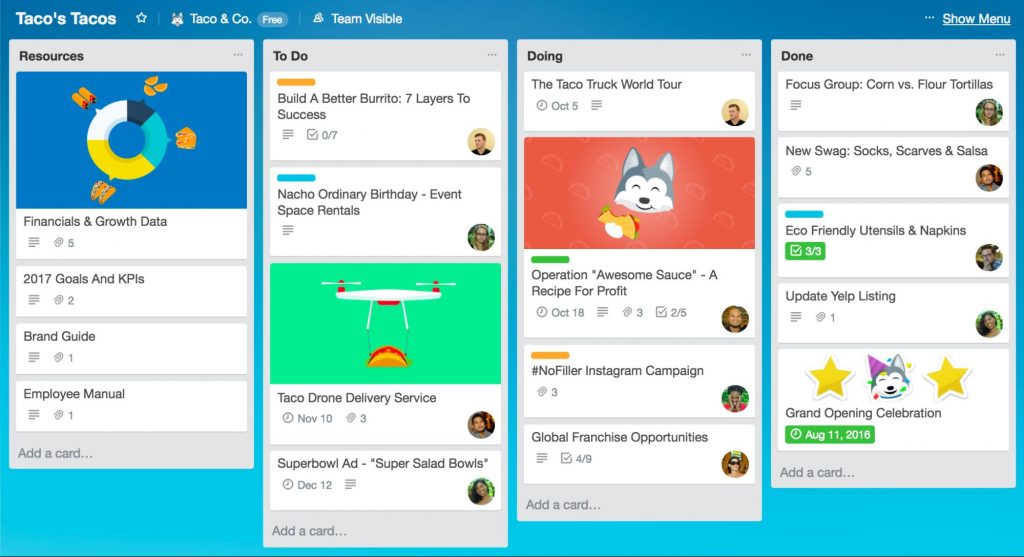
Shared inboxes as the end-all, be-all for real estate customer service
Of course, the ideal scenario is to have all of these resources in one centralized tool. That’s where a shared inbox comes in handy. A shared inbox is a collaborative digital workspace that allows professionals to connect with their teams without leaving their inboxes.
So, for example, instead of switching from your project manager to your emails, you set up a task management system in your email interface.
That’s what DragApp, our shared inbox solution, does. Drag turns your Gmail into a collaborative space for task management. A real estate agency that offers email-based customer support can set up a collaborative customer-facing email.
Then, when potential new customers message this address, all agents can see the inquiry in real-time, split by tags and categories. With the preview view, they can check any new task to see if it’s urgent or maybe should be forwarded to another department. All of it without leaving the main shared inbox or having to open hundred of new emails.
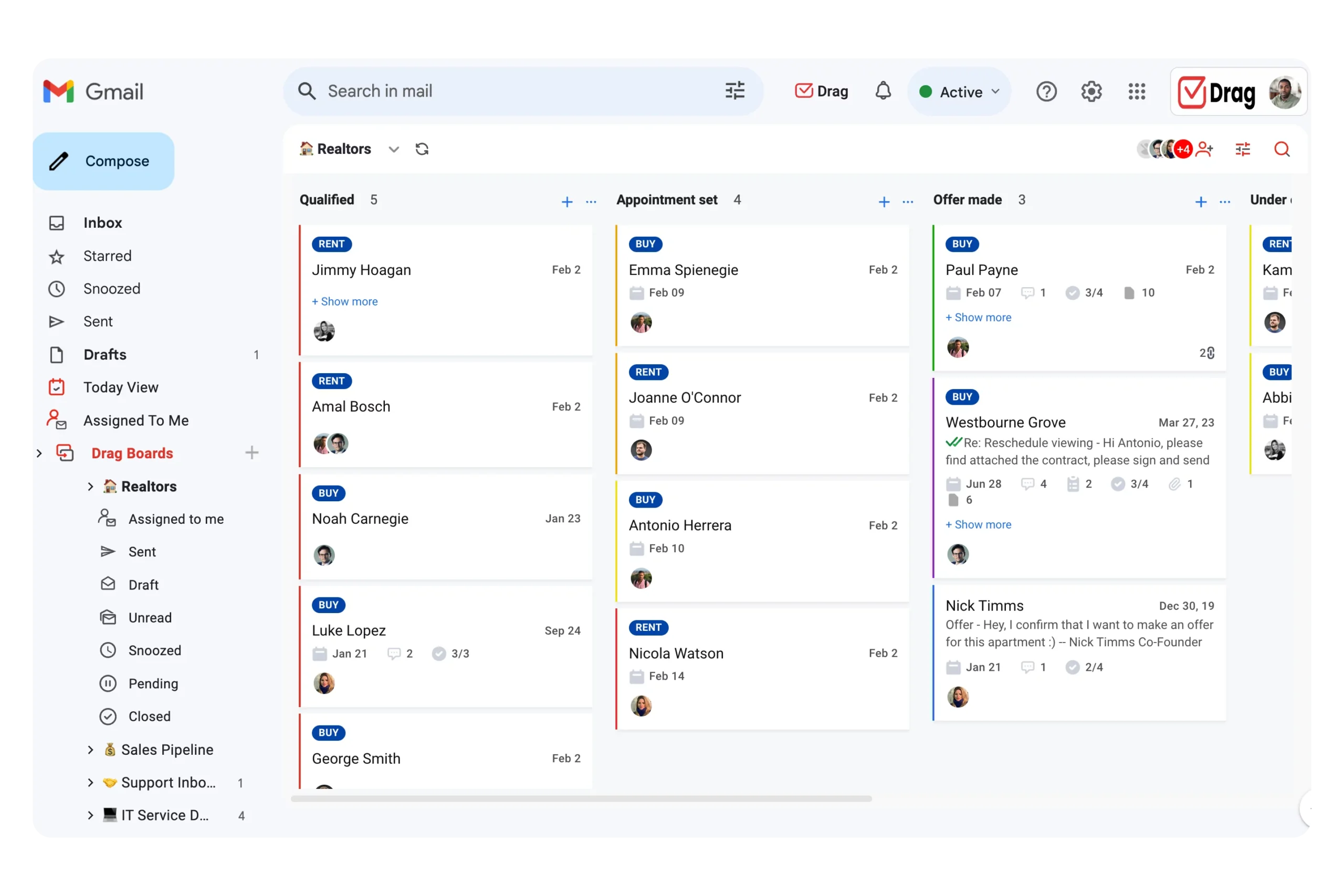
Team leads can assign specific clients to each agent based on availability, expertise and other concerns. For bigger agencies, you can even take advantage of automatic assignments, such as round-robin email management systems, to guarantee each client gets a fast enough response.
This means no message will stay unread for too long. It’s great practice, because it ensures good email response rates and times, while making sure each individual customer has the agent’s full attention. That way, it enhances the understanding between them and the chances of a good deal being closed.
The ongoing challenges of great real estate customer service
Even after you reach agreements with clients, real estate customer service requires attention. That is, establishing a good relationship with your client base so that you can secure future deals. Satisfied clients can also recommend your services to their acquaintances, leading to overall growth and profits.
Wrapping up
Many tools can benefit real estate customer service. Clanderas, virtual meetings, task managers and inbox management software, including shared inboxes. By setting up an efficient workflow, you can streamline your workflow while making your services more convenient and easier for customers.
Turn Gmail into your Team’s Workspace.
- 2.5x faster email responses.
- 20 hours less spent per month, per team member.
- 40% more deadlines achieved and happier teams.







